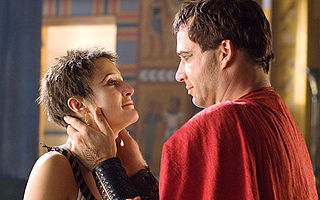- Deus Impeditio Esuritori Nullus (No God Can Stop a Hungry Man)
-
"Deus Impeditio Esuritori Nullus (No God Can Stop a Hungry Man)" 
Antony embraces Cleopatra Season 2 (2007) Episode "21" Air date(s) March 18, 2007 (HBO)
18 July 2007 (BBC)Writer(s) Mere Smith Director Steve Shill Setting Rome/Alexandria Time frame c. 32 BC
See also: Chronology of RomeLink HBO Summary Prev: "A Necessary Fiction"
Next: "De Patre Vostro (About Your Father)"
I | II | III | IV | V | VI | VII | VIII | IX | X | XI | XII
XIII | XIV | XV | XVI | XVII | XVIII | XIX | XX | XXI | XXII"Deus Impeditio Esuritori Nullus" (translation No God Can Stop a Hungry Man) is the ninth episode of the second season of the television series Rome. The air date is March 18, 2007. In 2008 the episode was selected as one of the "25 Sexiest TV Shows on DVD" by magazine Entertainment Weekly.[1]
Plot summary
Rome is facing a dire shortage of grain, forcing Octavian to barter with Mark Antony to get new shipments sent from Egypt. Mark Antony and Cleopatra continually increase their demands in exchange for grain, eventually driving away Octavian's negotiator. In so doing, Antony hopes to push Octavian into declaring war, which Antony believes he can win due to his support among the Roman people. As a last resort to sway public sentiment to his side, Octavian sends Atia and Octavia to Alexandria, knowing that Antony will reject his lover and lawful wife respectively. Octavian is proven correct: Antony refuses to see Atia and Octavia (owing to the fact he's in the middle of having sex with Cleopatra) and sends them back to Rome, enraging the citizens of Rome who wonder how their former hero could slight his Roman wife in favor of the "Egyptian whore." Posca secretly leaves Antony's service and defects to Octavian. Lucius Vorenus, who has been telling Caesarion ambiguous stories about Caesarion's father (the boy believes his father to be Julius Caesar though Vorenus is speaking of Titus Pullo), chooses to stay in Alexandria with Antony.
Octavian greets Atia upon her return to Rome, where Posca also delivers to him the last will and testament of Antony and Cleopatra. Octavian uses this as evidence that Antony has gone mad and has become a threat to the state, spreading the news to the people and gaining the Senate's support in a war against Antony. Octavian summons Titus Pullo for a personal audience in the Senate house and requests that Pullo come with him to Egypt, hoping that Pullo could reason with Vorenus and mediate for Antony. Pullo expresses his doubts, but agrees to escort Octavian.
At the Aventine Collegium, where Pullo is rationing out grain to increasingly restless Romans, Pullo makes final arrangements with his men and Vorenus' children, and leaves Mascius in charge. However, the night before Pullo leaves, he is attacked by Memmio, who Pullo had imprisoned in a small cage since his defeat in the gang wars. Memmio knocks Pullo unconscious and moves in to kill him with a knife. Gaia intervenes and kills Memmio, but she is severely wounded. As Gaia is being treated by a local doctor, she, aware that she is dying of loss of blood from her multiple stab wounds, confesses to Pullo that she had killed Eirene and their unborn baby. Pullo, seething with anger at this revelation, chokes her to death. The next morning he dumps her body unceremoniously into a muddy pool, thereby ensuring to Pagan custom that she will never enter the netherworld and her spirit will wander aimlessly in limbo because she has not received proper funeral rites.
References
- ^ "25 Sexiest TV Shows on DVD". EW. Entertainment Weekly and Time, Inc. 2008-11-11. http://www.ew.com/ew/article/0,,20240932_11,00.html. Retrieved 2008-11-19.
External links
- "Deus Impeditio Esuritori Nullus (No God Can Stop a Hungry Man)" at the Internet Movie Database
- HBO summary
Rome Characters Lucius Vorenus · Titus Pullo · Gaius Julius Caesar · Gnaeus Pompey Magnus · Atia of the Julii · Mark Antony · Marcus Junius Brutus · Servilia of the Junii · Niobe · Gaius Octavian · Octavia of the Julii · Quintus Valerius Pompey · Cato the Younger · Marcus Tullius Cicero · Timon · Marcus Agrippa · Cleopatra · Gaius Cassius Longinus · Posca · Eirene · Erastes Fulmen · Minor charactersEpisodes Passover · Son of Hades · These Being the Words of Marcus Tullius Cicero · Testudo et Lepus (The Tortoise and the Hare) · Heroes of the Republic · Philippi · Death Mask · A Necessary Fiction · Deus Impeditio Esuritori Nullus (No God Can Stop a Hungry Man) · De Patre Vostro (About Your Father)Related articles Categories:- 2007 television episodes
- Rome episodes
- Cultural depictions of Cleopatra VII
Wikimedia Foundation. 2010.
